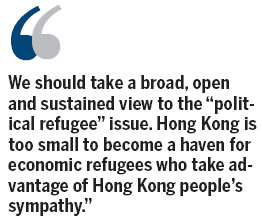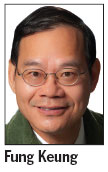Pro-refugee groups misguided
Updated: 2013-07-25 06:55
By Fung Keung(HK Edition)
|
|||||||

Many non-governmental organizations' executives, human-rights lawyers and Church groups leaders in Hong Kong criticized the SAR government on July 22 for not providing satisfactory welfare for the 5,000 "political refugees" trapped in the city.
Fernando Cheung Chiu-hung, a Labour Party lawmaker, plans to table a motion in the Legislative Council (LegCo) soon, urging the government to thoroughly review the welfare system for asylum seekers. According to press reports, Cheung told the 100 or so asylum seekers who gathered outside the venue where a government welfare panel met on July 22: "We are obligated to provide the basic needs of those who face persecution and come to Hong Kong as a transition. Your situation is totally unacceptable."
Sad to say, those people who sympathize with "political refugees", including Cheung, are misguided and ill-advised. Some of them might even have their own hidden agendas.
Hong Kong people are unquestionably sure that most of the 5,000 asylum seekers are economic refugees, fleeing poverty in their home countries in Africa and South Asia. If they were seeking political asylum, they would have gone to the mainland, which is party to the United Nations Refugee Convention (Hong Kong is not). The central government has the obligation to find willing "host countries" (such as Canada and Australia) to resettle political refugees should they decide not to stay on the mainland.

Why did the refugees choose Hong Kong and not the mainland? They have a higher living standard in this city than on the mainland. Many of them know darn well that they don't have a genuine political persecution case to present to the investigators if they go to the mainland.
If we improve the welfare of these 5,000 asylum seekers, Hong Kong will become a magnet for those who live in dire poverty in Africa and South Asia. This tiny city would become inundated as thousands head our way. Many Hong Kong people left for the United States in the 1960s and 1970s for the same reason (they were not persecuted by any government) - seeking a better life.
The 5,000 asylum seekers in Hong Kong each receive HK$1,200 per month in housing allowance, HK$1,000 for groceries and a small travel allowance. The allowances, not lavish by Hong Kong or international standards, meet the basic needs of the refugees. Any improvement in the payouts would undoubtedly provide an incentive for poverty-stricken Africans and South Asians. Many of them in fact are living on the mainland now, waiting for an opportunity to cross the Shenzhen River to come to Hong Kong.
This imaginary scenario would bring home my point. Assuming that many Hong Kong people earn HK$8,000 a month, if a certain Western country says it would offer a monthly allowance of HK$15,000 to anyone who resettles in it (no questions asked), wouldn't this group of local people be tempted to emigrate?
NGO officials, human-rights lawyers, religious leaders and political refugees spoke up for the asylum seekers in front of the LegCo panel on welfare services on July 22. Their arguments surprised few people as they focused on the interests of the refugees and not those of Hong Kong people. Their views invariably were narrow and restricted.
We should take a broad, open and sustained view to the "political refugee" issue. Hong Kong is too small to become a haven for economic refugees who take advantage of Hong Kong people's sympathy.
Hong Kong people aren't compassionless and cold-hearted. But we need to balance the interests of citizens who work hard to create wealth and those refugees who aspire for a better life in Hong Kong.
We don't owe the economic refugees anything.
The author is coordinator of the B.S.Sc in financial journalism program at Hong Kong Baptist University.
(HK Edition 07/25/2013 page1)